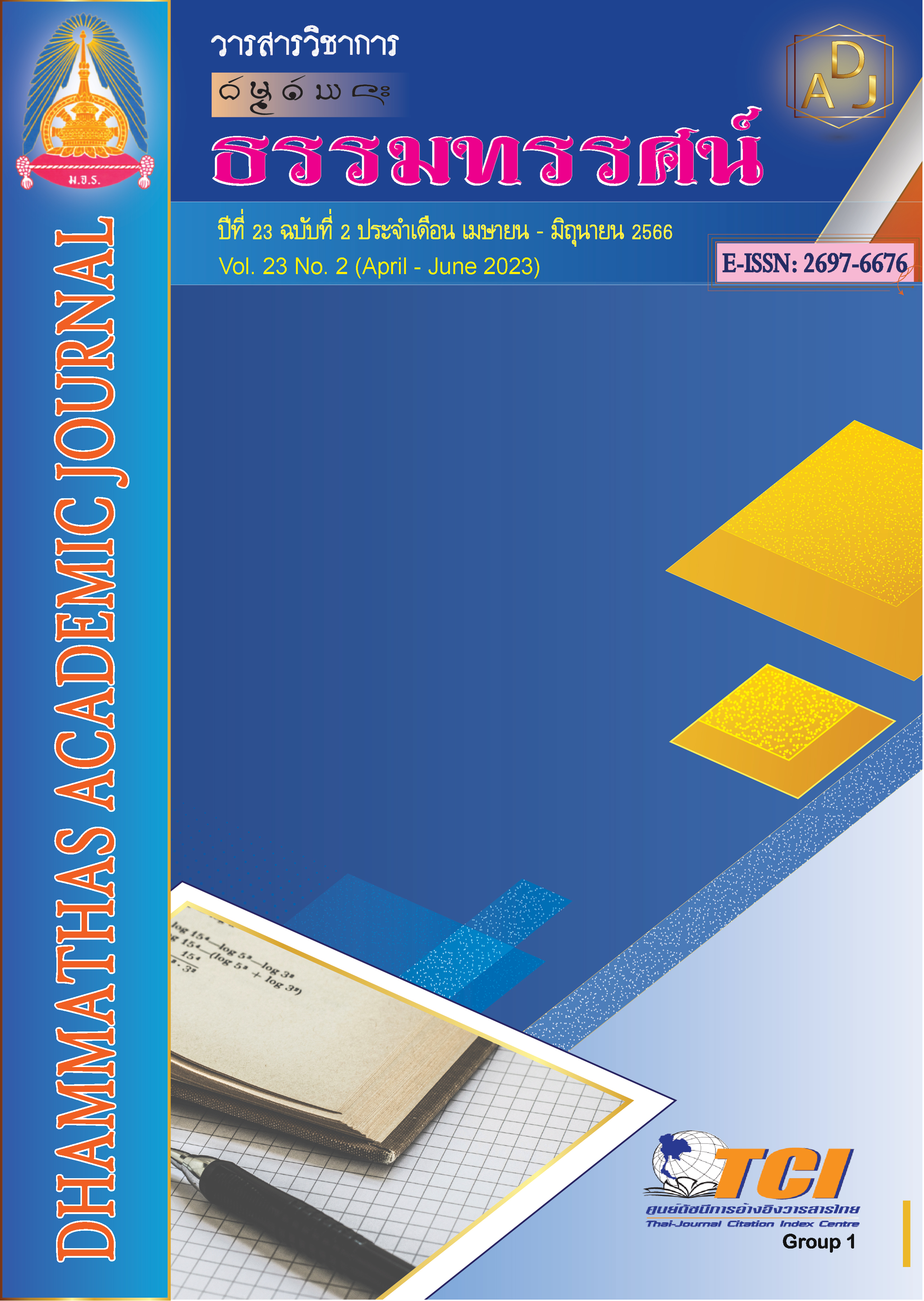A Comparison of School Administrators’ Participative Leadership as Perceived by Teachers in Schools under the Bangkok Secondary Educational Service Area Office
Main Article Content
Abstract
The purpose of this research was to; 1) investigate the participative leadership levels of school administrators according to teachers’ perception in schools under the Bangkok Secondary Educational Service Area Office, and 2) compare the participative leadership levels of school administrators according to teachers’ perception which was classified by affiliation, position/academic standing, and school size. The research concentrated on using descriptive research, which employed research instrument was a questionnaire with the reliability coefficients of 0.962, from 370 teachers in schools under the Bangkok Secondary Educational Service Area Office the academic year 2022. The sample size was calculated using Cohen’s table, and stratified sampling was used to select the sample participants. The statistics used in the research were mean, standard deviation, t-test, one-way ANOVA, and Scheffé’s multiple comparison method.
The findings of the research indicated:
1. Both of the overall and each dimension of participative leadership of school administrators were high level.
2. The results of participative leadership comparison’s levels of school administrators can be summarized as follows: the perception about participative leadership’s levels of school administrators with different classified by affiliation and school size were different with the statistical significance level of .05, except position/academic standing was not different.
Article Details

This work is licensed under a Creative Commons Attribution-NonCommercial-NoDerivatives 4.0 International License.
เพื่อให้เป็นไปตามกฎหมายลิขสิทธิ์ ผู้นิพนธ์ทุกท่านต้องลงลายมือชื่อในแบบฟอร์มใบมอบลิขสิทธิ์บทความ ให้แก่วารสารฯ พร้อมกับบทความต้นฉบับที่ได้แก้ไขครั้งสุดท้าย นอกจากนี้ ผู้นิพนธ์ทุกท่านต้องยืนยันว่าบทความ ต้นฉบับที่ส่งมาตีพิมพ์นั้น ได้ส่งมาตีพิมพ์เฉพาะในวารสาร วิชาการธรรม ทรรศน์ เพียงแห่งเดียวเท่านั้น หากมีการใช้ ภาพหรือตารางของผู้นิพนธ์อื่นที่ปรากฏในสิ่งตีพิมพ์อื่นมาแล้ว ผู้นิพนธ์ต้องขออนุญาตเจ้าของลิขสิทธิ์ก่อน พร้อมทั้ง แสดงหนังสือที่ได้รับการยินยอมต่อบรรณาธิการ ก่อนที่บทความจะได้รับการตีพิมพ์References
กิตติพงค์ ทาปง. (2563). ภาวะผู้นำแบบมีส่วนร่วมของผู้บริหารที่ส่งผลต่อความผูกพันต่อองค์การของครูในโรงเรียน สังกัดสำนักงานเขตพื้นที่การศึกษามัธยมศึกษา เขต 8. (วิทยานิพนธ์ศึกษาศาสตรมหาบัณฑิต). นครปฐม: มหาวิทยาลัยศิลปากร.
กิตติยา สุขเกษม. (2564). แนวทางการพัฒนาภาวะผู้นำแบบมีส่วนร่วมตามหลักพรหมวิหารธรรมของผู้บริหารสถานศึกษาในกลุ่มโรงเรียนจตุรมิตร อำเภอลาดยาว จังหวัดนครสวรรค์ สำนักงานเขตพื้นที่การศึกษาประถมศึกษานครสวรรค์ เขต 2. (วิทยานิพนธ์ศึกษาศาสตรมหาบัณฑิต). พระนครศรีอยุธยา: มหาวิทยาลัยมหาจุฬาลงกรณราชวิทยาลัย.
กิตติศักดิ์ ศรีคําเบ้า. (2565). ภาวะผู้นําทางวิชาการของผู้บริหารสถานศึกษาในกลุ่มสหวิทยาเขตศรีนครินทร์ สังกัดสำนักงานเขตพื้นที่การศึกษามัธยมศึกษากรุงเทพมหานคร เขต 2. Journal of Roi Kaensarn Academi, 7(9), 211-223.
พัสกร โหมเพ็ง. (2565). ภาวะผู้นําการเปลี่ยนแปลงของผู้บริหารสถานศึกษาตามการรับรู้ของครูในสถานศึกษาเครือข่ายที่ 42 สำนักงานเขตหนองจอกสังกัดกรุงเทพมหานคร. Journal of Roi Kaensarn Academi, 7(7), 93-108.
วิชุดา บุญเทียม. (2565). การศึกษาภาวะผู้นําเชิงนวัตกรรมของผู้บริหารสถานศึกษาตามความคิดเห็นของครู สังกัดสำนักงานเขตพื้นที่การศึกษามัธยมศึกษากรุงเทพมหานคร เขต 2. วารสาร มจร มนุษยศาสตร์ปริทรรศน์, 8(1), 173-188.
สำนักงานเขตพื้นที่การศึกษามัธยมศึกษากรุงเทพมหานคร เขต 1. (2565). รายงานผลการดำเนินงานประจำปีงบประมาณ พ.ศ. 2565. กรุงเทพฯ: สำนักงานคณะกรรมการการศึกษาขั้นพื้นฐาน กระทรวงศึกษาธิการ.
สำนักงานเลขาธิการสภาการศึกษา. (2563). รายงานประจำปี 2563. เข้าถึงได้จาก
http://backoffice.onec.go.th/uploaded2/Category/202105/PaperAnnualReport2563.pdf
อนุสรา เย็นวัฒนา. (2565). ภาวะผู้นำเชิงกลยุทธ์ในศตวรรษที่ 21 ของผู้บริหารสถานศึกษา สังกัดสำนักงานเขตพื้นที่การศึกษามัธยมศึกษากรุงเทพมหานคร เขต 2. วารสารวิจัยราชภัฏกรุงเก่า, 9(3), 71-83.
Cohen, J. M., & Uphoff, N. T. (1981). Rural Development Participation: Concept and Measure for Project Design Implementation and Evaluation: Rural Development Committee Center for international Studies. New York: Cornell University Press.
Cohen, L., Lawrence, M., & Keith, M. (2011). Research Methods in Eeducation. (7th ed). London: Routledge.
Johnson, C. E. (2015). Meeting the Ethical Challenges of Leadership: Casting Light or Shadow. Newberg, Oregon: George Fox University.

